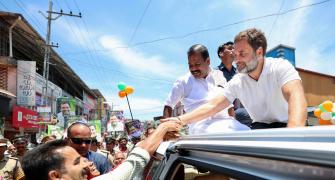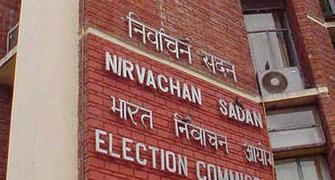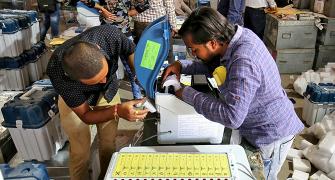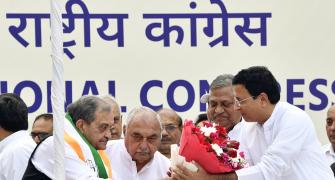Even if they score administratively, state governments ruled by the party suffer from an inability to communicate positively, say observers. Kavita Chowdhury, Raghu Krishnan, Sanjeeb Mukherjee & G Sreedathan report.
 Congress President Sonia Gandhi, addressing the Congress chief ministers' conclave in June, had advised the nine chief ministers to take lessons from the 2014 Lok Sabha polls.
Congress President Sonia Gandhi, addressing the Congress chief ministers' conclave in June, had advised the nine chief ministers to take lessons from the 2014 Lok Sabha polls.
While stressing the need for government administration and party organisation to work cohesively, she'd urged them to actively engage in better communication and publicity. That advice seems to have gone unheeded.
There appears little effort from the nine Congress-ruled states to push through an aggressive political or administrative agenda that could act as a brand differentiator, in the face of a resurgent Rajasthan or Madhya Pradesh. Even as in the case of Karnataka, where several of its schemes have been adopted as models by the central government, the state has failed to sufficiently publicise this.
The thrust in Congress states continues to be largely on social welfare schemes than on the economic reforms agenda laid out by the Narendra Modi government. Although Assam (e-districts initiative), Karnataka and Kerala have stepped up digitisation initiatives and have linked their websites to the Centre's 'Digital India' portal.
Niti Aayog (it replaced the Planning Commission) officials say: "The Congress-ruled states like Kerala and the northeastern states are more difficult to convince about the need for reforms. In the case of the NE states, it is understandable as they have special concerns and needs."
The Aayog has lately been impressing upon state governments to undertake major structural reforms in governance and economic parameters like land, labour laws and in agriculture. Officials said, while states across the board agreed for the need for reform, the Congress-ruled states differed on many aspects.
Officials say they pace to make special efforts to reach out to the Congress state governments, in comparison to the ease with which Bharatiya Janata Party states hopped on.
Three Congress CMs -- Karnataka's Siddaramaiah, Uttarakhand's Harish Rawat and Assam's Tarun Gogoi -- have been made part of the three sub-groups on revamping Centrally-sponsored schemes, Swachh Bharat Abhiyan and Skill India. However, Siddaramaiah declined to take over as convenor of the SBA, citing lack of time.
Be it the five Congress-ruled NE states or the remaining four, with the BJP-led government at the Centre, a common complaint has been of a funds crunch due to the funding model for central schemes being rejigged from the earlier 90:10 model during the Congress-led UPA rule.
Karnataka
The largest Congress-ruled state, Karnataka has pioneered the use of information technology for governance, with even the Modi government seeking inputs from it, on the mobile governance initiative. It has linked social security projects like the 'Anna Bhagya' scheme to the Prime Minister's Jan-Dhan Aadhaar Mobile. Karnataka's state-level bankers committee, which focuses on financial inclusion, has shifted to the database set up by the Centre to reduce corruption and reach out to beneficiaries.
Despite such initiatives, Siddaramaiah has been more in the news for criticising Modi's policies, rather than any of his state government's achievements. Even on the Centre's much hyped SBA, Karnataka has overtaken BJP-ruled states by building 400,000 additional toilets, while Mysore has topped the list of clean cities in the country.
The government in the state adhered to the party line and opposed the Centre's new land bill, labeling it arbitrary, while retaining the UPA law. Even as it focused group housing schemes in tier-2 and tier-3 towns, it criticised the Centre for merely "tweaking" the earlier JNNURM of the UPA.
Kerala
In poll-bound Kerala, the Congress-led United Democratic Front government's tenure has been marked by internal feuds and scams. The saving grace has been the pathetic condition of the opposition Left Democratic Front.
Nonetheless, through all the scams (solar scandal, 'bar bribery'), Chief Minister Oommen Chandy has managed to stump his rivals and consolidate his position. The latest laurel for the state is the proposed Vizhinjam International Transshipment Terminal. Even as the government boasts of the Kochi Metro, Kannur airport and Technocity, the industrial and agricultural sectors are in crises. 'Vision 2030' to make Kerala at par with Nordic countries, unveiled with much fanfare in 2013, has petered.
According to observers, Chandy emerged the gainer from the worst crises. What has worked in his favour has been factionalism within the ruling party and governing alliance, alongwith an ever-depleting LDF. There were even accusations of 'big brother' in the LDF alliance, the CPI(M), doing an "adjustment agitation" with the ruling UDF.
In such a fractious political environment, Chandy might spring a surprise, buck the trend and come back to power in 2016. It helps that he rode the party to victory in the Lok Sabha elections and Assembly by-elections.
Assam, Arunachal, Manipur, Meghalaya and Mizoram
With five of the seven northeast states under Congress rule, since the time the NDA stepped into office in 2014, the Congress has cried out against "political bias" against these. In fact, all the Congress CMs - Gogoi (Assam), Ibobi Singh (Manipur), Nabam Tuki (Arunachal Pradesh), Lal Thanhawla (Mizoram) and Mukul Sangama (Meghalaya) -- boycotted the Prime Minister's meeting of NE states in the capital in July this year.
The largest of the NE states, Assam, led by veteran Gogoi, has been routinely making national headlines for rampant factionalism in the state Congress unit. It led to disgruntled Hemanta Biswa Sarma moving over to the BJP, young leaders in tow. In such a scenario, with the state going into polls in 2016, the CM is focused on launching populist schemes.
From low-priced shops for tea plantation workers to freebies for agricultural workers, the state is slated to formally unveil 25 such schemes for Rs 862 crore in the coming month. Observers say development has fallen casualty to factionalism in the state unit, with the CM training most of his energies on dousing those fires.
Disagreeing, former state party head Bhubaneshwar Kalita says: "Congress states are very bad in publicity and marketing their achievements." He blames the slowing of development in certain sectors in the state to the drying of central funds.
Gogoi had protested the Centre's move for a financial cut in the mass employment generation scheme, MGNREGS. The state was one of the first to announce implementation the UPA's Right to Food law. But, party insiders say the scheme has been hit due to the bad financial situation of the state.
Ascribing the "slow development" of the NE states in general to the insurgency-afflicted status of most and the geographical terrain, party functionaries note that the states survive largely on central funds and large infrastructure projects. Any lack in these hampers progress, they say.
Uttarakhand
Many believe Chief minister Harish Rawat, belied many of the promises with which he came into office in February 2014. The floods of 2013 had proved a major setback and although Rawat managed to restore the 'Char Dham' circuit, it has still not picked up on tourist footfall.
The CM ascribes it to "negative media' coverage. The CM''s insistence on developing medium and small enterprises and industry in the hills, in preference to those in the plains, has found no takers.
For a state that at one time attracted major industries in Haridwar and Pantnagar, the recent record on industrialisation has been dismal. Rawat is more focused on social sector and welfare schemes like student scholarships and old-age pensions.
Himachal
Figuring among Congress' most powerful chief ministers, Virbhadra Singh, the state's six-time CM, is facing bad times.
Having to firefight a series of corruption allegations, the CM has been more involved in that, with governance taking a back seat.
Although the Congress ensured it protested against a sitting CM's house being raided, that too when his daughter was getting married, it did not garner the sympathy that it expected to.
The state's woes have been exacerbated by the fact that its major revenue earner, hydro power projects, of late have no takers. It is hoping that low-cost power will attract investors, more so as the government has stalled any rise in rates of supply.
Himachal used to lead in indicators of health and education. It has been complaining that the funds crunch has hit schemes like JNURRM and the MGNREGS.
Faced with a politically inimical central government, which is targeting its CM, the state is caught in the unenvious position of its own revenues drying and it being dependant on central finances.









